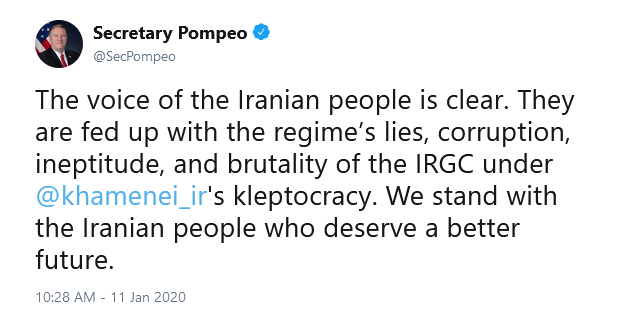Iran // Resisting the warmongers’ provocations~ 10 min

By Duarte Guerreiro and Francisco Norega
The Iranian government accepted responsibility for the downing of Ukraine International Airlines Flight 752 on the outskirts of Tehran, apologizing for a “human error” that cost the lives of 176 people. These statements sparked protests in the Iranian capital and an outcry by western mass media against the wicked regime.
The death of innocent civilians is unforgivable and an apology won’t return the victims to their families. However, something was different: Iran issued a public and formal apology and the IRGC was ordered to open an investigation to find those responsible for the disaster.
When was the last time we heard of a western government leader apologizing for the civilian deaths caused by one of their imperialist adventures, and pledging to find and punish the people responsible within the Armed Forces? More likely, the civilian deaths are dismissed as unfortunate collateral damage and the culprits usually receive a commendation instead of being punished.
It’s hard to look favourably upon Iran’s political system – authoritarian and theocratic, merciless with dissenting voices. And still, it is a system that proved to be more serious and prudent than any other player during last weeks’ events in the Middle East.
The murder of Soleimani and Mahdi on the night of January 4th, in an attack ordered directly by Trump, pushed the Middle East to the brink of a new and bloody conflict. Soleimani was executed for being the “world’s number 1 bad guy” and Mahdi presumably won the right to die alongside him for being his associate in Iraq. Nobody gave another thought of the other 8 people who accompanied them, nobody apologized and nobody was blamed or punished.
After 3 days of mourning for the death of one of the most iconic figures of the Iranian State, retaliation was carried out by the Iranian armed forces in a determined, incisive and, above all, clean way. So clean that it didn’t make the bigger headlines nor opened the TV news reports, because the mass media couldn’t use it as casus belli. A retaliation that sent a clear message to the USA and its allies, but whose meaning did not reach the public.
On the night of January 7, 22 ballistic missiles were fired by Iran against two American positions: the Al Asad air base, on western Iraq, and facilities in Erbil, on Iraqi Kurdistan. The Iranian Foreign Minister stated that the attack was a “proportionate measure in self-defense under article 51 of the UN Charter”, that Iran considered the retaliation for the death of its general completed and that it hoped for a diplomatic resolution to the crisis, even if it was ready to “defend ourselves against any aggression”.
The most important detail of this attack: despite the missiles having hit their targets, there were no deaths. Why? Because Iran’s goal was not to kill but to damage the US war machine and to show they are equipped to do it. Therefore, two hours before launching the attack, they informed the Iraqi authorities of their plans, which then communicated them to US troops, that could then head to shelter.
Iran thus demonstrated that US positions aren’t invulnerable, not even the Al Asad base where Trump felt “very safe” during his visit on Thanksgiving. We don’t know if North-American air defenses were activated but, if they were, they couldn’t prevent 15 of the 17 missiles fired against this base from reaching their target.
And the message seems to have been understood by the buffoon-in-chief, who backed down on his threats. During a statement the next morning, Trump rejected the possibility of a strong retaliation against Iran, opting rather for another batch of sanctions.
Were it not for the tragedy of the Ukrainian plane, Iran would have managed a brilliant diplomatic and military exit from this delicate crisis. But on that same morning, while the IRGC was on high alert for the potential US retaliation that Trump had promised days before, a human error sealed the fate of the 176 people aboard Ukraine Airlines Flight 752.
The airplane had taken off minutes earlier from Tehran airport and was mistaken by a cruise missile approaching an important IRGC position. The operator who received the information was obliged to establish contact with command for verification. Due to an alleged glitch in the communications system, with just 10 seconds to decide, the operator finally launched a missile against the plane.
Amir Ali Hajizadeh, commander of the IRGC Aerospace Forces accepted responsibility for the tragedy, stating at a press conference that he “wished he was dead and had not witnessed such an accident”.
The admission of guilt by the IRGC for the death of these 176 people, many of them Iranian nationals, sparked a wave of unrest on social media and the vigils mourning the victims quickly turned into protests against the government, in contrast to last week’s demonstrations of widespread unity, in response to the murder of Soleimani.
Trump didn’t lose any time, publishing a message on Twitter in English and Farsi “to the brave, long-suffering people of Iran: I’ve stood with you since the beginning of my Presidency, and my Administration will continue to stand with you”.
Mike Pompeo, Secretary of State, also tweeted his support to the Iranian people, which he says is “fed up with the regime’s lies, corruption, ineptitude and brutality”. It’s worth noticing that Twitter is blocked in Iran and was never a popular platform anyway. These tweets are for domestic consumption. After all, only the consent of the American public is needed for a war against Iran – Iranians have no say in the matter.
In contrast, Defense Secretary Mark Spencer stated in an interview that the US are available for talks with Tehran authorities, admitting they are “still a legitimate government” of the country, but saying such discussions should revolve around “a series of steps by which Iran becomes a more normal country”.
Doesn’t this all feel like a buildup to intervention under the pretext of liberating people from their tyrants? Maybe Trump’s last warning can clarify any doubts that might remain: “There can’t be another massacre of peaceful protesters, there can’t be another internet shutdown. The world is watching.”
We can only dream that the US may one day be as swift to criticize the repressive policies of the Spanish State against the organizers and participants in the Catalonian independence referendum of 2017 (for which 13 Catalan politicians were convicted to heavy prison sentences). Or the unending cases of police brutality against the Yellow Vests and other protest movements in France during the last year – as a result, at least 2 people were killed (according to conservative estimates), 25 people were blinded in at least one of their eyes, more than 500 were injured and many hundreds arrested and detained.

The truth is, even before Iran took responsibility, several respectful leaders were already raining down condemnations. We can imagine that the reactions of the “democratic world” and its mass media were a lot different when Flight 655 of Iran Air was struck by a US missile in 1988. 290 people were killed in that tragedy.
The US government never officially apologized for the event and offered compensation to Iran and the families of the victims solely on an ex gratia basis, that is to say, as if out of courtesy and charity. Bush Senior, then vice-president, said in one of his speeches “I will never apologize for the United States of America”. In 1990, the Captain and the lt. Commander of the USS Vincennes, the ship which launched the missile, were commendated with the Legion of Honour.
There’s no way to devalue nor excuse this most recent tragedy. Still, it is worrying that it might be used as a pretext for another imperialist war in the Middle East and to eradicate an obstacle to the global hegemony of the US and its pals. Let’s imagine: in 1988, the downing of Flight 655 sparks protests in the US in which thousands ask for the resignation of the president and the removal of the US government, prompting Middle East leaders to launch an offensive against the US to liberate its people from the system that oppresses them.
The demonization of Iran and its leaders paves the way for an hypothetical “muscular intervention” to give the oppressed people of Iran the democracy that they so clearly long for, as has become habit of the West towards all countries that stand in its way, whether in Latin America, Africa or Asia.
That’s why it’s important to deconstruct these arguments that demonize Iran, and Soleimani as an evil man and murderer. That Soleimani was a special forces commander who did what special forces do – kill, torture, kidnap, terrorism, etc. – it’s doubtful anyone will deny it. Even the fiercest supporter of the “regime” probably admits it.
But he was also one of the most beloved figures of a good part of the Iranian people, as demonstrated by the huge crowds that took to the streets all over Iran to mourn his death, even in regions of greater opposition to the Iranian government. Maybe because he was a symbol that it is possible to win against the imperialist might of the US and its allies and to restore peace to the region – and be proud of such an accomplishment.
The feeling is completely understandable, given the suffering imposed on the region by the US for decades now. Without Iran, without Soleimani, ISIS would have been faced with a much more fragmented adversary – Soleimani’s main role was as a diplomat with a hand on the holster, able to persuade thousands of different, quasi-opposed forces to work together against a common enemy.
Iran deserves our respect for the clean way it performed its part of the geopolitical dance during the last few weeks, avoiding deaths, and thus avoiding the beginning of a new large scale conflict in the region. Even if one doesn’t sign blank cheques to everything else its government does.
It deserves our respect for being one of the main forces supporting local groups fighting ISIS on the ground during the last few years. It deserves our respect for being one of the last obstacles to the savagery of western imperialism trying to destabilize all of the Middle East and North Africa by force. And it also deserves our respect for publicly accepting responsibility for downing the Ukrainian Boeing, formally apologizing and pledging to determine the culprits of the deaths of these 176 people and punish them.
When did Bush and his pals apologize for having invaded Iraq under the false pretext that Saddam’s dictatorship had weapons of mass destruction, beginning a conflict that conservative estimates say took the lives of around 200 000 civilians?
During Barack Obama’s era, special operations forces spent years in Syria training and arming groups of “moderate rebels”. These weapons repeatedly ended up in the hands of jihadi groups, when it was not the rebels themselves defecting to those groups after the training programs ended. US training and weapons have contributed to the torture, murder, beheading and enslavement of thousands of people in territories controlled by jihadi groups like al-Nusra (al-Qaeda’s branch in Syria).
When did Obama apologize for this, and pledged to punish those responsible? When did the European powers apologize for their aggression against Libya, the death of Muammar Gaddafi and the spiral of violence that followed?




